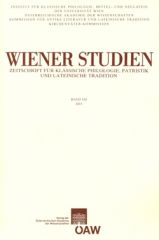
Wiener Studien 124/2011, pp. 5-16, 2011/11/07
Zeitschrift für Klassische Philologie, Patristik und lateinische Tradition

Pindar composed splendid victory odes for Sicilian tyrants, but his statement „I disapprove of the fate of tyrannies“ tells us nothing about his attitude towards Hieron or Theron. In its context in the 11th Pythian, it is a comment on the fate of Agamemnon, Klytaimestra and Aigisthos. The poet supplied what his clients commissioned and paid for – it was essentially a business relationship. Pindar’s praise for Hieron und Theron is measured, not flattery; they were not power-greedy despots like Hieron II, Dionysios or Agathokles, let alone the dictators of the 20th and 21st centuries.